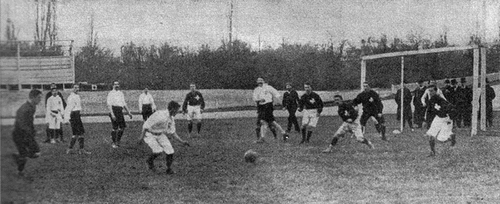
There are jokes aplenty to be made about the Swiss football team following the nation as a whole with its attitude towards neutrality. The reality is that the Swiss have never had a particularly strong personality when it comes to the football that is played by their teams.
Where the Germans promise organisation, the Italians ensure defensive strength and the Spanish offer flair and excitement, Switzerland have always been very bland as far as the country’s football is concerned.
This lack of personality is reflected in Switzerland’s performances on the international stage, to say nothing of the country’s nickname. As you’d expect from a country with an interesting history in a geographical sense, the Swiss are variously known as the Schweizer Nati in German, La Nati in French or Squadra nazionale in Italian.
That, unfortunately, is about the most exciting thing to report on Switzerland when it comes to their international football.
Introduction to Swiss Football
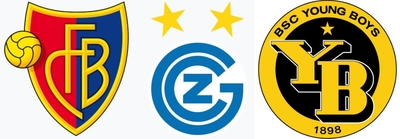 There isn’t a lot more to talk about on the domestic front. The top-flight in Switzerland is the Swiss Super League, currently known as the Raiffeisen Super League due to sponsorship. There are a number of teams from Switzerland that keen football fans may well have heard of, including the always amusingly named Young Boys. Grasshopper, Sion and FC Zürich also compete in the various Swiss leagues. The most successful club in the recent era, however, is unquestionably FC Basel.
There isn’t a lot more to talk about on the domestic front. The top-flight in Switzerland is the Swiss Super League, currently known as the Raiffeisen Super League due to sponsorship. There are a number of teams from Switzerland that keen football fans may well have heard of, including the always amusingly named Young Boys. Grasshopper, Sion and FC Zürich also compete in the various Swiss leagues. The most successful club in the recent era, however, is unquestionably FC Basel.
From 2000 until 2019 there have been nineteen top-flight campaigns, eleven of which have been won by Basel. Three of the others were won by FC Zürich, two went to Grasshopper in the early noughties, but the good old Young Boys fought their way to victory twice in recent years. It would be fair to assume that the Swiss Super League has, historically at least, not been all that competitive,
This lack of competitiveness might well be part of the reason that Swiss sides have never done all that well in Europe. No team from Switzerland has ever reached the final of either the UEFA Champions League, formally known as the European Cup, or the UEFA Europa League, historically known as the UEFA Cup. That said, Fussball Club Basel have impressed at times on the European stage. In 2002 they reached the final of the Intertoto Cup, losing to Aston Villa. They have also regularly been a thorn in the side of English teams in the Champions League, with Liverpool, Chelsea and Manchester United all having fallen foul to the Swiss team in the past.
In this section of the website we’ll tell you something about the stadiums you’ll find in Switzerland, the league system set-up there as well as the country’s performances on the international stage. We’ll also let you know how the game of football made its way to the home of Swiss chocolate, CERN, and questionable banking practices.
Swiss Stadiums
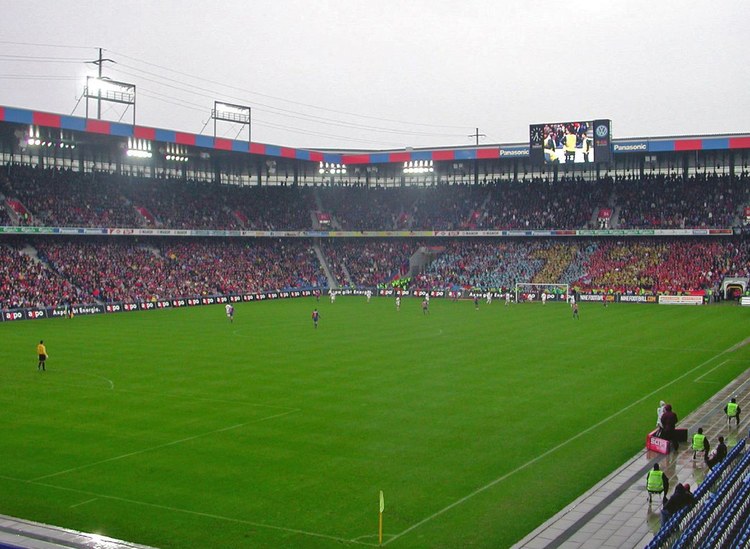
It says something for the sort of football stadiums you can find in Switzerland that the largest capacity ground in the entire country comes in at under 40,000. St. Jakob-Park, the home of FC Basel, is a state-of-the-art stadium that has been used to host major games in the past, not least of which was the 2016 UEFA Europa League final between Liverpool and Sevilla. It is obviously a rather small place when compared to European behemoths such as the Nou Camp or Old Trafford, however.
Switzerland may not be the sort of place that you’d want to head to if you’re a fan of huge stadiums, but there are more than a few grounds around the country that promise the spectacular. If there’s one thing that Switzerland most certainly can offer then it’s incredible views with stunning mountain ranges as the backdrop. Numerous stadiums in the country take advantage of exactly that, ensuring that you can soak up the location even if the ground itself offers less than 10,000 seats.
Swiss Leagues
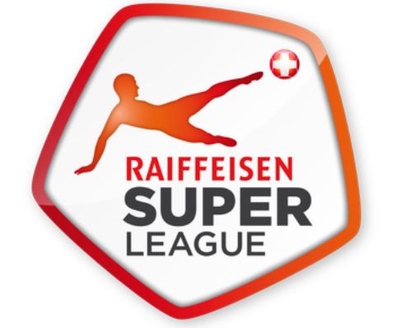 As you’d expect from a country famed for its neutral approach to…well…pretty much everything, the Swiss League System is set-up to ensure that even the lowliest club in the entire country could one day progress far enough to become champions of the top-flight.
As you’d expect from a country famed for its neutral approach to…well…pretty much everything, the Swiss League System is set-up to ensure that even the lowliest club in the entire country could one day progress far enough to become champions of the top-flight.
All of the leagues are interconnected and the hierarchical format ensures that promotion and relegation between the leagues is possible and run on a fair basis.
There are ten teams competing in the Super League, another ten taking part in the Challenge League – which is the country’s second-tier division – and sixteen competing in the third-tier that is known as the Liga Promotion. The Swiss system is not only open for teams from Switzerland as seven teams from Liechtenstein also take part in it as well as clubs from Germany and Italy.
There are actually thousands of teams playing across hundreds of divisions and groups. Beneath the Liga Promotion the leagues tend to be divided into regional groups.
Switzerland National Team
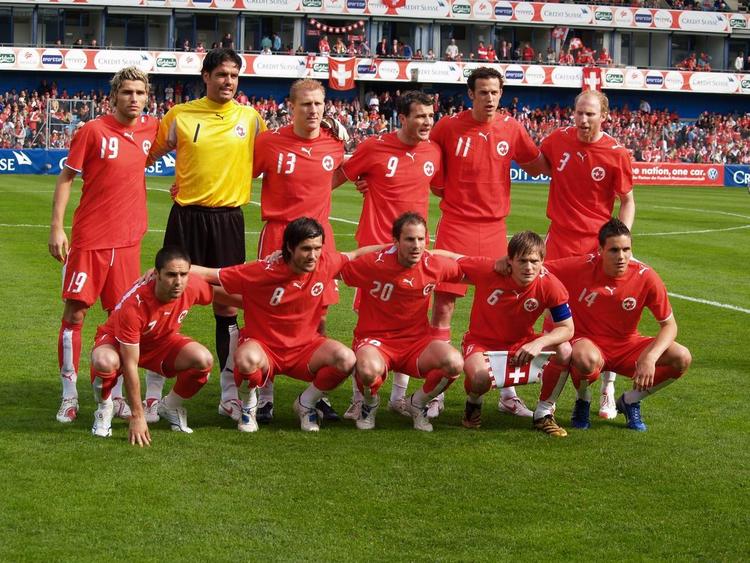
Switzerland’s first ever international match took place in 1905 when the team went up against France in Paris and lost by a respectable scoreline of 1-0. Though they have never won a major international tournament they have performed relatively well in a number of them. In both 1934 and 1938 they reached the quarter-final stage of the World Cup. They achieved the same fate in 1954 when Switzerland was actually the host nation for the event. In 2006 the Swiss set a somewhat unwanted record in the same competition when they were eliminated despite not conceding a goal in normal time, losing on penalties to Ukraine in the last sixteen.
In other international competitions the Swiss have enjoyed mixed success. In 1924 they won the silver medal at the Summer Olympics, losing 3-0 to Uruguay in the final. In the European Championships, however, Switzerland have only ever once made it out of the group stages. They didn’t qualify for the tournament until 1996, missing out in 2000 before returning in 2004 and 2008. They missed out once more in 2012 but in 2016 the Swiss enjoyed their best ever performance in the competition when they made it to the round of the last sixteen before losing on penalties to Poland.
Key Stats
| Switzerland National Team Statistics | |
|---|---|
| Year Formed | 1905 |
| Home Stadium | Stade de Suisse Wankdorf |
| Stadium Capacity | 32,000 |
| Major Honours | None |
| Current Manager | Vladimir Petković |
| Top Scorer | Alexander Frei (42) |
| Most Caps | Heinz Hermann (118) |
| Best Performance at World Cup | Quarter-Finals (1934, 1938, 1954) |
| Best Performance at European Championships | Last Sixteen (2016) |
| Kit Colours | Red and White (Home), White and Red (Away) |
History Of Football In Switzerland
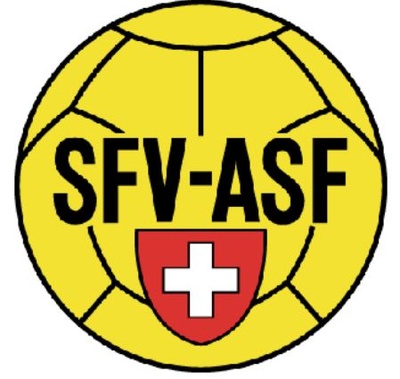 Though the Swiss national team has achieved very little on the international stage, the country has still been very influential on football as a whole. Switzerland’s Football Association was formed in 1895 and they were a founding member of FIFA.
Though the Swiss national team has achieved very little on the international stage, the country has still been very influential on football as a whole. Switzerland’s Football Association was formed in 1895 and they were a founding member of FIFA.
In fact, FIFA is based in the Swiss city of Zürich and UEFA’s headquarters can be found in Nyon. The Swiss FA was, of course, founded as a reaction to the number of teams springing up around the country. The first of these was FC St. Gallen that was formed in 1879.
As with the rest of Europe the game made its way to the country from England. Amusingly, it wasn’t until 1899 that the Swiss realised they’d got the dimensions of the goal wrong and had made theirs twice the size of the goals used in England!
The game as we know it nowadays wasn’t to everyone’s taste in the country, with plenty of Swiss people preferring the game that was closer to rugby and calling the new sport the ‘English disease’.
